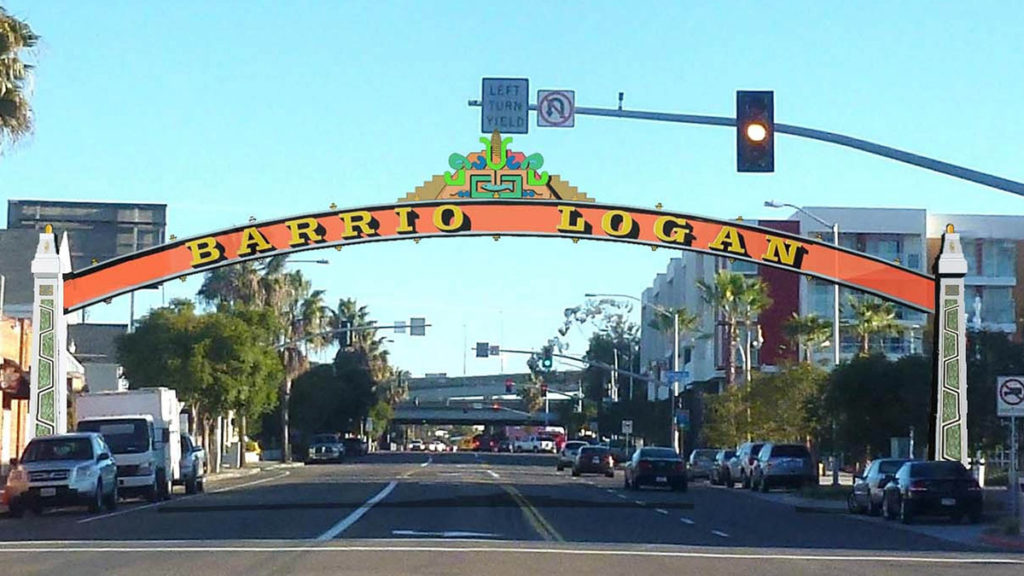Barrio Logan sits next to the I-5 freeway, tucked beneath the Coronado Bridge. To the west, the booms of shipbuilding cranes dot the horizon. Culture and pride stretch from every corner of the neighborhood, but activists say it was largely shut out from COVID-19 vaccine access.
For residents in this community, a few things made getting the vaccine just a little bit harder. Many residents do not have computers, which means they are not computer literate, and some parts of the neighborhood are simply not wired for the internet, according to community activists. The majority Latino community also faces language barriers.
For over 50 years, the Chicano Park Steering Committee (CPSC) has been a steward of the neighborhood. When COVID-19 hit Barrio Logan, the group held a community meeting along with the Brown Berets and produced a plan to reach out to community members who might be struggling.
University of San Diego professor Alberto Pulido Lopez, who also sits on the CPSC, points out that historically, this community has faced hard times.
“Highest levels of asthma, anywhere in the state of California is here in this neighborhood,” Pulido said. “[And] highest rates of COVID in the community on top of the asthma.”
COVID attacks the respiratory system and in this neighborhood that could mean certain death.
“When the pandemic first hit the community, I mean, Barrio Logan had really, really high rates of COVID,” said Cheran Matewaay, a member of the San Diego Chapter of The Brown Beret National Organization. “Because a lot of our gente (people) there could not just stop going to work, could not just start working online or remotely, a lot of people were laid off.”
The community knew they had to act.
“We didn’t go out and ask whether groups come and try to help us, we’re taking the lead, we’re working with another organization as partners to make sure that this comes to the community the right way,” said Lucas Cruz, a member of the Chicano Park Steering Committee.
“The vaccine was being distributed — it was pretty inequitable and inaccessible to people in our community,” Matewaay said. “We need[ed] to have our own line to the vaccine so that our people can be put to the front of that line and not left behind.”
The county of San Diego’s website was difficult for community members to navigate, according to some.
“It was like trying to get Comic-Con tickets, you get on there and as soon as you try to get an appointment it’s gone,” Cruz said.
The group was able to put on three separate vaccination events and vaccinated about 1,000 people just by canvassing the neighborhood.
The Brown Berets stood in front of Northgate Market and walked through the neighborhood signing people up. They signed up people who might have otherwise been forgotten.
“Day laborers, essential workers, people who had to ask for time off from work,” Pulido said. “I had to sign papers to prove that they actually had to come here because their employers wouldn’t let them come.”
A community hotline was created to help people find resources. The Brown Berets put up signs across the community offering help through a special hotline.
“We put signs around the community saying that if you needed help during the pandemic to give us a call,” Matewaay said. “We would try to connect them with whatever they needed.”
“How do I get free diapers? Where is the closest food bank to where I live? How do I sign up for unemployment?” Those were some of most common questions the hotline fielded, according to Matewaay.
As customers along Barrio Logan’s main drag dwindled down to nothing, businesses fought to stay alive.
“A lot of them were forced to shut down through the state regulations. They were losing a lot of revenue, some of them had to move out,” Cruz said. “Nobody came down here to tell people to get those permits set up to do the outdoor vending, to have the extension into the street.”
Cruz said the business owners came together and started organizing amongst themselves to help each other understand what they had to do to get the permits. The Logan Heights Community Development Corporation also helped businesses by holding workshops and connecting owners to information.
The CPSC also started feeding school kids on Saturdays and started sanitizing the bathrooms, benches and playgrounds at Chicano Park.
Despite their best efforts, loss and grief still rippled across the community.
“It was pretty devastating, I would say for a lot of people, a lot of us knew a lot of people have passed away and a lot of people that were sick,” Matewaay said.
But the work brought a community together and the future is bright.
“I think we need to look forward and celebrate all this important work, celebrate life, celebrate what we’re doing because you know, there’s a lot of good, there’s a lot of good that has come from this,” Pulido said.
